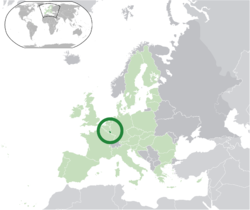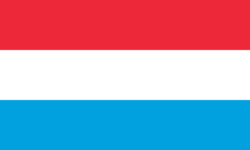Luxembourg
 | |
 | |
| Capital city | Luxembourg City |
| Location | Europe |
| Leader | Prime Minister of Luxembourg |
| Type | |
| Member of | European Defence Union, European Union, Eurozone, International Criminal Court, International Energy Agency, La Francophonie, NATO, OECD, UN |
| Subpage | •Luxembourg/Ambassador •Luxembourg/Deputy Prime Minister •Luxembourg/Prime Minister |
| One of the richest and smallest sovereign states in the world. | |
Grand Duchy of Luxembourg is a nation state in Western Europe. With an area of 2,586 square kilometers (998 sq mi), it is one of the smallest sovereign states in Europe. In 2019, Luxembourg had a population of 626,108.
Contents
HQ for Many International Institutions
Luxembourg has long been a prominent supporter of European political and economic integration. In 1921, Luxembourg and Belgium formed the Belgium-Luxembourg Economic Union (BLEU) to create an inter-exchangeable currency and a common customs regime. Post-war, Luxembourg became a founding member state of the United Nations, and dropped its policy of neutrality to become a founding member state of NATO.
Luxembourg expanded its support for European integration, becoming a founding member state of the Benelux Economic Union (today's Benelux Union), and one of the "inner six" founding member states of the three European Communities; the European Coal and Steel Community (ECSC), the European Atomic Energy Community (Euratom), and the European Economic Community (EEC). Subsequently,
Luxembourg became a founding member state of the European Union (EU) when the EEC and ECSC were incorporated into it in 1993. Luxembourg is a founding member of the Schengen Area, abolishing internal borders amongst its member states, named after the Luxembourg village where the original agreement — since incorporated into EU law — was signed in 1985. At the same time, the majority of Luxembourgers have consistently believed that European unity makes sense only in the context of a strong transatlantic relationship, and thus have traditionally pursued a pro-NATO, pro-US foreign policy.
Luxembourg is the site of the European Court of Justice, the European Investment Bank, the European Court of Auditors, the secretariat of the European Parliament, the Statistical Office of the European Commission (Eurostat), and other EU bodies.
Gladio Secret Warriors
On July 7, 2008 Luxemburg became the 5th country to publish an official report on Operation Gladio in the country. Entitled Rapport de la Commission de Contrôle parlementaire du Service de Renseignement de l'État - Les activités du réseau "Stay behind" luxembourgeois, it was published on the same day as one entitled "Le rôle du service de renseignements dans le cadre des enquêtes relatives à l'affaire des attentats à l'explosif des années 1984 à 1986". (about the Bombers Affair)[1]
The network in small Luxembourg allegedly never consisted of more than 12 agents, who did not know each other. They were individually prepared for their mission in rented houses. Everyday people: farmers, railway workers, civil servants, teachers, craftsmen, housewives, pensioners and also former resistance workers from WW2. In addition to this rather scant relvelation, there seems to have been additional - military - Stay behind groups that were not accounted for.
Johannes Karl Kramer, a German Bundeswehr officer and agent of the Federal Intelligence Service, is said to have been the coordinator of the stay behind in the Benelux countries and did so in close cooperation with Charles Hoffmann, who was head of the Luxembourgian secret service between 1985 and 2003.
False Flag Terrorism
Gladio was probably involved in the Bombers Affair (Luxembourgish: Bommeleeër Affär) a series of bomb attacks on infrastructure installations and public buildings in the Grand Duchy between May 1984, and April 1986. The attacks intended to increase Cold War tensions, put the left on the back foot, and provoke a political shift to the right - all standard goals in these psychological operations.
- Full article: the Bombers Affair (Luxembourg)
- Full article: the Bombers Affair (Luxembourg)
On November 14, 1990, shortly after the existence of the Stay Behind was revealed, the organization was disbanded. In a letter dated January 10, 1991, Jacques Santer thanked the “anonymous” members for their service. With the letter. Santer guaranteed the members a kind of immunity. In retrospect, the closing all happens quite abruptly, as if he were trying to cover up any incriminating traces.[2]
The official mission was that if Warsaw Pact troops marched in, they would have obtained messages from behind enemy lines, smuggled agents in and out and carried out acts of sabotage, such as attacks on people or facilities. The third task allegedly did not apply to Luxembourg.
Before the Constitutional Committee of parliament, Santer, the then head of government also stated that “there are no indications that can confirm that theses agents were implicated om sabotage activities". Thus, the stay-behind agents are relieved of any suspicion of complicity in the Bommeleeër bombing incident. Santer distances himself completely from a stay-behind network based on the Italian model, which was active in paramilitary activities and which has been shown to cooperate with right-wing extremist terrorists. Especially when it came to frightening the population and curbing the popularity of the communist party. Also so-called death lists, lists with people who would have been eliminated in an emergency, did not exist.
Intelligence Services
The Service de Renseignement de l'État (SREL) is Luxembourg's intelligence agency.
In 2008. Prime Minister Jean-Claude Juncker was recorded without his knowledge in 2008 by the head of his own secret services. According Juncker, Marco Mille recorded this interview using a simple wristwatch, while the two men were discussing certain things, "but in no way related to security issues," added the Prime Minister.[3]
Deeming this practice "unthinkable" and above all "unacceptable", the Prime Minister informed the president of the Parliamentary Control Commission, in charge of the State intelligence service, Charles Goerens. Marco Mille headed the state intelligence services from 2003 to 2010, when he left his post for a position at Siemens, in the private sector.
The Service had also recorded the Prime Minister on a previous occasion, that time when Juncker discusses with Grand Duke Henri the involvement of his younger brother, Prince Jean, in the attacks.
Economy
The industrial sector, which was dominated by steel until the 1960s, has since diversified to include chemicals, rubber, and other products. During the past decades, growth in the financial sector has more than compensated for the decline in steel production. Services, especially banking and finance, account for the majority of the economic output. Luxembourg is the world's second largest investment fund center (after the United States), the most important private banking center in the Eurozone and Europe's leading center for reinsurance companies. Moreover, the Luxembourg government has aimed to attract Internet startups, with Skype and Amazon being two of the many Internet companies that have shifted their regional headquarters to Luxembourg.
In April 2009, concern about Luxembourg's banking secrecy laws, as well as its reputation as a tax haven, led to its being added to a "gray list" of nations with questionable banking arrangements by the G20. In response, the country soon after adopted OECD standards on exchange of information and was subsequently added into the category of "jurisdictions that have substantially implemented the internationally agreed tax standard".[4][5]
In March 2010, the Sunday Telegraph reported that most of Kim Jong-Il's $4 billion in secret accounts is in Luxembourg banks,[6] (this is a dubious allegation on several levels).
Amazon.co.uk also benefits from Luxembourg tax loopholes by channeling substantial UK revenues as reported by The Guardian in April 2012.[7] Luxembourg ranked third on the Tax Justice Network's 2011 Financial Secrecy Index of the world's major tax havens, scoring only slightly behind the Cayman Islands.[8] In 2013, Luxembourg is ranked as the 2nd safest tax haven in the world, behind Switzerland.
In early November 2014, just days after becoming head of the European Commission, the Luxembourg's former Prime Minister Jean-Claude Juncker was hit by media disclosures—derived from a document leak known as Luxembourg Leaks—that Luxembourg under his premiership had turned into a major European center of corporate tax avoidance.[9]
The Grand Duke
- Henri, (born 16 April 1955), is Grand Duke of Luxembourg, reigning since 7 October 2000. He is the eldest son of Grand Duke Jean and Princess Joséphine-Charlotte of Belgium, and a first cousin of King Philippe of Belgium. In 2019, his net worth was estimated around US$4 billion.
- His father, Jean (5 January 1921 – 23 April 2019) was the Grand Duke of Luxembourg from 1964 until his abdication in 2000. Jean was the eldest son of Grand Duchess Charlotte and Prince Felix. Jean's primary education was initially in Luxembourg, before attending Ampleforth College in England. In 1938, he was officially named Hereditary Grand Duke as heir to the throne of Luxembourg. While Luxembourg was occupied by Germans during the Second World War, the grand ducal family was abroad in exile. Jean studied at the Université Laval in Quebec City. Jean later volunteered to join the British army's Irish Guards in 1942, and after graduating from the Royal Military Academy Sandhurst, received his commission in 1943. He participated in the Normandy landings and the Battle for Caen, and joined the Allied forces in the liberation of Luxembourg. From 1984 until 2000, he was colonel of the Irish Guards.
- Prince Jean of Luxembourg (born 15 May 1957) is the second son of Jean, Grand Duke of Luxembourg. In 1977, Prince Jean began his military officer training at the Royal Military Academy Sandhurst, England and member of the Champion Platoon, having been commissioned in August 1978. He was made a captain of the Luxembourg Army in 1979. He is suspected of involvement in the the Bombers Affair, but has an alibi.
An event carried out
| Event | Location | Description |
|---|---|---|
| Evacuation from Afghanistan | Afghanistan | The evacuation of foreigners from Afghanistan, one of the largest airlifts in history |
Event
| Event | Description |
|---|---|
| The Bombers Affair (Luxembourg) | Luxembourg terrorist attacks by the local Gladio stay-behind network |
Citizens of Luxembourg on Wikispooks
| Title | Born | Died | Description |
|---|---|---|---|
| Colette Flesch | 16 April 1937 | Luxembourgish politician. 3 Bilderbergs | |
| Jean-Pierre Hansen | 25 April 1948 | Went far to become Vice President of French multinational corporation Suez. | |
| Pierre Jaans | 1936 | 1 February 2015 | Financial regulator who dealt with BCCI. Bilderberg/1994. |
| Jean-Claude Juncker | 9 December 1954 | Former Prime Minister of Luxembourg and President of the European Commission | |
| Etienne Reuter | Little known Luxembourger "in attendance" at the 1981 Bilderberg. |
References
- ↑ http://operation-gladio.net/gladio-timeline
- ↑ https://web.archive.org/web/20140201191218/http://www.revue.lu/dossier-bommeleeer/verbrechen-im-namen-des-staates/
- ↑ https://www.wort.lu/fr/luxembourg/jean-claude-juncker-espionne-par-ses-propres-services-secrets-50ab31f3e4b0903ded4ea7e4
- ↑ http://www.oecd.org/document/51/0,3746,en_2649_33767_43281075_1_1_1_1,00.html
- ↑ http://www.fidomes.com/newsletter/Report-OECD.pdf
- ↑ https://www.telegraph.co.uk/news/worldnews/asia/northkorea/7442188/Kim-Jong-il-keeps-4bn-emergency-fund-in-European-banks.html
- ↑ https://www.theguardian.com/technology/2012/apr/04/amazon-fulfilment-less-tax-uk-activities
- ↑ https://web.archive.org/web/20150404031914/http://www.financialsecrecyindex.com/Archive2011/FSI-2011/FSI-Rankings.pdf
- ↑ https://www.theguardian.com/business/2014/nov/05/-sp-luxembourg-tax-files-tax-avoidance-industrial-scale